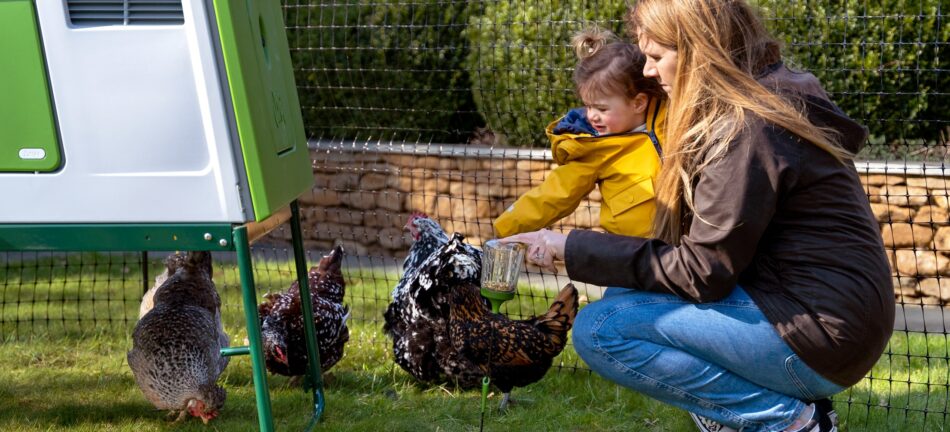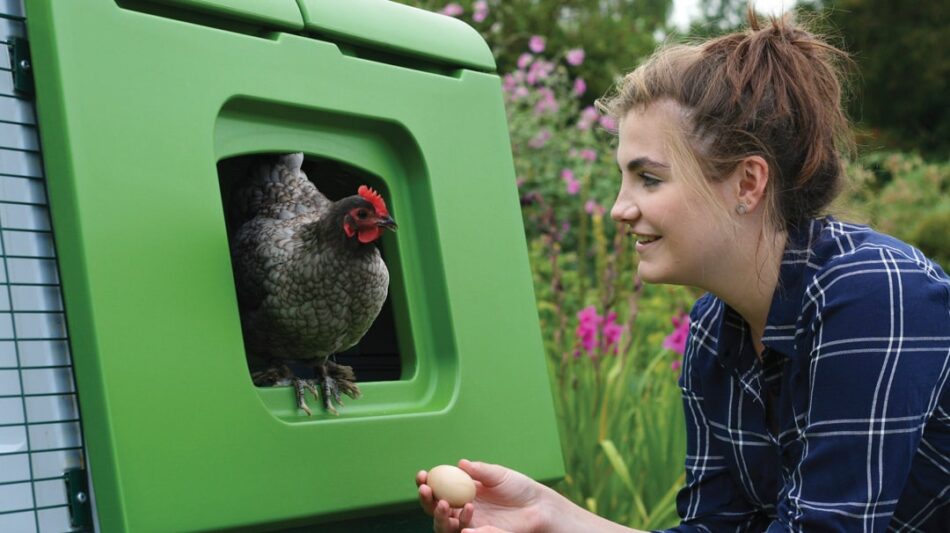How to convince your family to let you get chickens
Wondering how to convince your family (or roommates) to let you get chickens? You aren’t alone. There are many misconceptions about chickens and their care that cause many people to baulk at the idea of owning them. But, like most reservations, most of these concerns are unfounded. Here is our best advice on how to get others on board with the idea of getting chickens. Bust common myths and put care concerns to rest — and you’ll soon have your entire household clamouring to keep chickens.
6 myths about keeping chickens
Debunking some common myths about keeping a flock will be your first step in convincing your family to let you get chickens. While this is not an exhaustive list, these are the main concerns raised when families consider keeping chickens.
Myth #1: Chickens smell bad
While it’s true that hens’ droppings smell, hens themselves have no odour. If their coops are kept clean there will be virtually no stench from your chickens’ setup. Our easy-to-clean chicken coops ensure that your hens’ home stays fresh and clean from just minutes of cleaning each day.
Your hens will keep themselves clean by preening their feathers and taking chicken dust baths. Choose odour-absorbing material like pine pellets, sand, or finely crushed rock for the base of your chickens’ run to eliminate any outdoor odours. Finally, use a pressure washer or soap and water on the interior surfaces of your chicken coop once a week, and you should experience little to no odour from your garden flock.
Myth #2: Chickens take up a lot of space
Depending on the breeds of chickens you keep, most of them don’t require much space. Of course, your flock will be happiest with the most space possible, but there are options that will make the best use of the space available. Mobile chicken coops allow you to move your hens’ home to the most convenient spot, or relocate them whenever you need to. Your flock can help you mow your grass, control the bug population, or enjoy shady areas through the use of a mobile chicken coop.
Don’t want your flock to have access to the entire garden? Chicken fencing or a walk in chicken run enables you to customize your flock’s area within the space available in your garden.
Myth #3: Chickens are noisy
Most of the time, when people think of noisy chickens they conjure up the image of a crowing cockerel. While cockerels are in fact quite loud, hens make quiet noises that are not likely to disrupt the neighbourhood. Occasionally, hens may make louder sounds, but these are usually reserved as warning cries. When they “sound the alarm”, it’s usually because of a perceived threat.
Some breeds are more vocal than others, so if noise is a concern, it’s best to do some research beforehand. Faverolles, Polish, and Wyandottes are among some of the more boisterous breeds that you may want to avoid if noise is of concern. There are also some hens that will loudly proclaim that they have laid an egg. The ruckus is short-lived, but they will often get the entire flock going for a few minutes in a celebratory cheer. This behaviour is most common in young hens that are just beginning to lay.
Myth #4: Chickens will fall prey to predators
Chicken predators are a real threat, but the reality is that if you keep your flock in a predator-resistant setup, you can greatly mitigate the risk they pose. Heavy-duty wire weld chicken runs with anti-dig skirting will help protect your flock from the most common predators that would make a meal of your hens.
If you have dogs or cats that patrol your garden, your risks of dealing with chicken predators are greatly reduced. And, for those that would strike your chickens’ coop after dark, an automatic chicken coop door can be added to your hens’ house to help keep them safe from nocturnal intruders.
Myth #5: Chickens will prevent me frotravellingng
Chickens are surprisingly self-sufficient, especially compared to other types of pets. Their main needs are:
- Safe housing
- A secure run
- Free-choice feed
- Fresh water
- An established roost-to-rise routine
Assuming these are met, you can safely leave your flock overnight. If you’re going to be gone longer than a day or two, it’s a good idea to get a chicken sitter. This is especially true if weather conditions are below freezing or uncomfortably hot to make sure your flock’s water remains palatable.
Daily chicken care doesn’t take all that long, and usually, chicken sitters are happy to be compensated in eggs for their time. A neighbour or local friend or family member are great resources when looking for someone to check in on your flock while you’re away.
Myth #6: Chickens need a cockerel in order to lay eggs
This is one of the most common misconceptions that exist about chickens. But to put this notion to bed: hens do not need a cockerel in order to lay eggs. Most hens ovulate every 24-36 hours, which means they can produce one egg roughly every day and a half — with or without a cockerel.
Winning your family over
Next, it’s time to present all of the ways in which chickens benefit their owners. Many hens are social and bond with their owners — some even capable of learning tricks. But personalities aside, there are several other reasons to own chickens.
Fresh eggs
Probably the most obvious reason for keeping chickens is the prospect of providing fresh eggs for your family. The difference between store-bought eggs and fresh eggs is startling. Many families need only to see the difference between the two eggs to be fully convinced of the higher nutritional value of fresh eggs.
To show your family the difference between the two, simply crack a fresh egg into a bowl next to a store-bought egg. Eggs bought in a store are lighter and thinner in appearance, while fresh eggs have a deep, rich colour to their yolks and a thicker consistency.
Help in the garden
Chickens can make for great helpers in the garden. They provide natural fertilizer through their droppings, and through the use of chicken tractors, your flock can till up your soil and control pests like slugs, ants, beetles, spiders, and even scorpions.
Strategically placed chicken fencing or chicken runs can allow your chickens to prune overgrowth and provide weed control in your garden. And, mobile chicken coops let your flock graze different sections of your garden to help with mowing.
Chickens as family pets with Omlet
Like other pets, chickens require time and responsibility, and it’s right that families take owning them into careful consideration. But with quality chicken-keeping products from Omlet, you’ll be able to start out strong and enjoy keeping chickens for years to come. Our chicken coops, chicken toys, and chicken runs are all designed to last a lifetime and bring joy to both flocks and their families.
This entry was posted in Chickens


